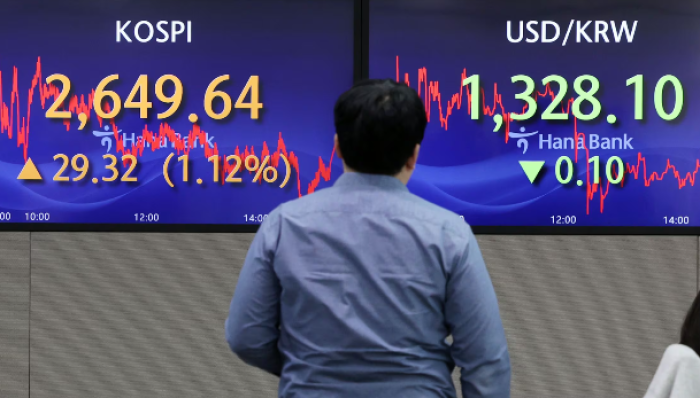The South Korean stock market has seen increased volatility and few rallies over the past three months, in sharp contrast to government hopes that its short-selling ban would buoy shares and reduce market fluctuation, The Korea Economic Daily found on Tuesday.
The main bourse Kospi and junior Kosdaq have experienced 1.19% and 1.5% daily volatilities, respectively, since Nov. 6, 2023, when
the country began a complete prohibition of short-selling in the local market until the end of June 2024, The Korea Economic Daily understood.
The daily fluctuations in the Kospi and Kosdaq are 0.29 percentage point and 0.07 percentage point higher, respectively, compared with the figures between Jan. 3 and Nov. 4, 2023.
The daily volatility is a standard deviation of daily stock price changes for a certain period. The higher the figure, the more volatile the stock price.
The Kospi’s fluctuation stood out as the main bourse has a high portion of foreign and institutional investors, said an investment banking source.
The ban on short-selling hasn’t made a meaningful impact on boosting the stock market, in contrast to the government’s intention.
The Kospi has risen 5.89% since the prohibition, but the jump largely came from recent increases in prices of stocks with low price-to-book ratios after the government announced a “value-up” program to bolster underperformers in the local stock market in late January.
The Kospi plunged 8.76% for eight trading days from Jan. 3 and started a rebound on Jan. 17. The Kosdaq has only gained 0.67% since prohibiting naked short-selling.
Many investors have left the local stock market since the ban on short sales. On the Kospi, individual stakeholders dumped more than 16 trillion won ($12 billion) worth of stocks since the ban.
PLUNGING SHARESMany stocks, which have a relatively high portion of short-selling among transactions, have plunged around 20% over the past three months.
Some battery sector large-cap shares have plummeted since Nov. 7. Kospi-listed POSCO Future M Co. has fallen 21.03%; Lotte Energy Materials Co. has dropped 21.27%; L&F Co. and SKC Ltd. have declined 23.81% and 13.34%, respectively.
Kosdaq-listed EcoPro Co. and EcoPro BM Co. have respectively plunged 23.31% and 19.73%.
Hotel Shilla and Lotte Tour Development Co. stocks dropped 13.81% and 21.58% during the period. Their short balances are respectively 194.8 billion won and 48.7 billion won, the two largest among the Kospi stocks.
On the Kosdaq, medical test kit maker Humasis Co. and biotech STCube Inc. nosedived 25.88% and 28.78% during the period, respectively.
Analysts warn that the local stock market will be hard hit as investors will flock into short-selling after the government lifts the ban in July.
“The short-selling ban has only focused on individual investors’ concerns on stock prices, without full consideration of the positive effect of short sales to overall markets,” an investment bank source said.
“It is likely that the Federal Reserve will delay rate cuts and Korea’s exports will fall in the second quarter, which will lead to even higher volatilities in the stock market once the government lifts the ban,” the source added.
Write to See-Eun Lee at
see@hankyung.com
Jihyun Kim edited this article.





